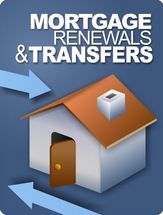What is a mortgage?
Few people can come up with the entire amount of money required to pay for the cost of a home. A mortgage
is a loan of the money most people require to finance the purchase
their home. A mortgage allows individuals to buy property without paying
the full value all at once. The mortgagor is the person borrowing money, the mortgagee is the lender of the money.
When negotiating the amount of your mortgage, you should be aware that you will most likely be required to provide a down payment which is the money you put towards the purchase price of your home. The amount of your mortgage is determined by the purchase price of the home less the amount of your down payment. As with all loans, a mortgage must be repaid by the borrower with interest. There are different types of repayment methods which make up the different kinds of mortgages available.
Like all loans, regular payments made over time go towards paying down the mortgage. These payments are made up of two parts – one part goes towards paying the principal (the amount of money borrowed) and other part goes towards paying the interest (the fee charged for borrowing the money.)
The more money you can put down, the less you will have to borrow, and the less interest you will have to pay over the length of the mortgage.
If you have a down payment equivalent to 20% or more of the purchase price, you will have what is called a conventional mortgage.
If your down payment is less than 20% of the purchase price, you will have what is called a high ratio mortgage. A high ratio mortgage must be insured to protect the lender. This insurance is called mortgage default insurance. It protects the lender in case the borrower isn’t able to repay the loan.
Canada Mortgage and Housing Corporation (CMHC), Canada Guaranty and Genworth Financial offer assistance to first-time home buyers who do not have a lot of disposable funds for a down payment. Ask your mortgage professional for more details.
When negotiating the amount of your mortgage, you should be aware that you will most likely be required to provide a down payment which is the money you put towards the purchase price of your home. The amount of your mortgage is determined by the purchase price of the home less the amount of your down payment. As with all loans, a mortgage must be repaid by the borrower with interest. There are different types of repayment methods which make up the different kinds of mortgages available.
Like all loans, regular payments made over time go towards paying down the mortgage. These payments are made up of two parts – one part goes towards paying the principal (the amount of money borrowed) and other part goes towards paying the interest (the fee charged for borrowing the money.)
The more money you can put down, the less you will have to borrow, and the less interest you will have to pay over the length of the mortgage.
If you have a down payment equivalent to 20% or more of the purchase price, you will have what is called a conventional mortgage.
If your down payment is less than 20% of the purchase price, you will have what is called a high ratio mortgage. A high ratio mortgage must be insured to protect the lender. This insurance is called mortgage default insurance. It protects the lender in case the borrower isn’t able to repay the loan.
Canada Mortgage and Housing Corporation (CMHC), Canada Guaranty and Genworth Financial offer assistance to first-time home buyers who do not have a lot of disposable funds for a down payment. Ask your mortgage professional for more details.


